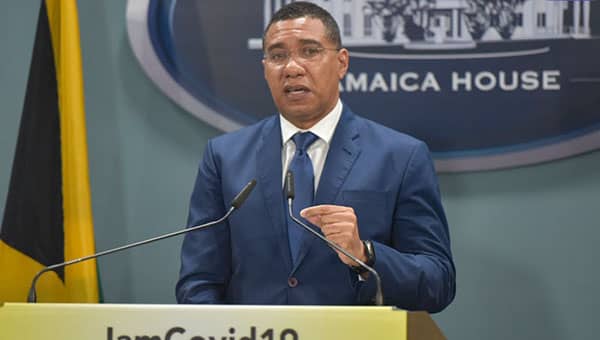
Prime Minister Andrew Holness on Thursday described the wholesale lifting of the measures implemented under the Disaster Risk Management Act (DRMA) in 2020 to contain spread of the novel coronavirus as a “personal relief”, even while noting that management of the pandemic will continue under existing public health laws rather than through the powers of the executive.
“In the management of the pandemic, for me, declaring an end to the DRMA is a personal relief because in our democracy it is not usual for there to be such an extended use of executive powers. I was very reluctant in using it and sought to ensure that I had no excesses in the use of executive powers by bringing them to Parliament on every occasion that it was possible to do so, and have it debated here so that the Opposition could have an input in what was being done,” Holness stated.
The Government, on March 13, 2020, invoked provisions under the DRMA, ranging from curfews to lockdowns and social distancing measures, as the principal regulatory tool for managing the health crisis.
On Thursday, the prime minister, making his contribution to the 2022/23 budget debate, announced, to thunderous applause, that after two years of “dexterously balancing lives and livelihoods with executive powers under the DRMA”, the orders have been gazetted making it so that effective today, Friday, March 18, 2022, the order and all the measures therein under the DRMA will be withdrawn.
“There is a genuine argument to be used and accepted that executive powers, if used at an extended scale, could be a threat to democracy, and we on this side recognise that and have never debated that point. But we have used it because it was efficient, it was quick, it gave us agility to respond and I think when the history is written about this period it will be said that the Government conducted itself well within the boundaries of democracy,” the prime minister said.
According to Holness, while it is acknowledged that the pandemic is not over, its management must be mainstreamed into the general, normal management of public health safety and public order.
“It is no longer sustainable to manage the pandemic as a special project by executive order through the DRMA. However, risks still remain and continued vigilance is necessary, especially for vulnerable populations,” Holness noted.
As such, he said some measures will be retained and incorporated into regulations issued under the Public Health Act.
These are: The requirement for people who test positive for COVID-19 to isolate; the requirements for laboratories to protect the privacy and identity of people testing for COVID-19; hand-washing and sanitation measures, and mask-wearing in enclosed spaces to which the public has access, for example, supermarkets, banks, tax collectorates. These will be retained until April 15, 2022.
Holness said while mask-wearing will not be mandated, it will be recommended in establishments that serve food, liquor, or drink for consumption within the premises.
Regarding travel, the prime minister, in observing that “it is becoming more difficult and expensive for incoming travellers to obtain COVID-19 tests”, said the Administration has decided to retain, also until April 15, 2022, the requirements to obtain a pre-test within three days prior to travel. He said after this, the measure will be assessed with a view to its removal.
Holness further said restrictions applicable to correctional facilities, prisons, hospitals, nursing homes and infirmaries will become a matter of policy for the ministries of health, local government, and national security.
“We are not declaring an end to the pandemic; there are still outbreaks happening all over the world. We are maintaining the management of the disease under our existing public health laws,” Holness emphasised.
Advertise with the mоѕt vіѕіtеd nеwѕ ѕіtе іn Antigua!
We offer fully customizable and flexible digital marketing packages.
Contact us at [email protected]
















